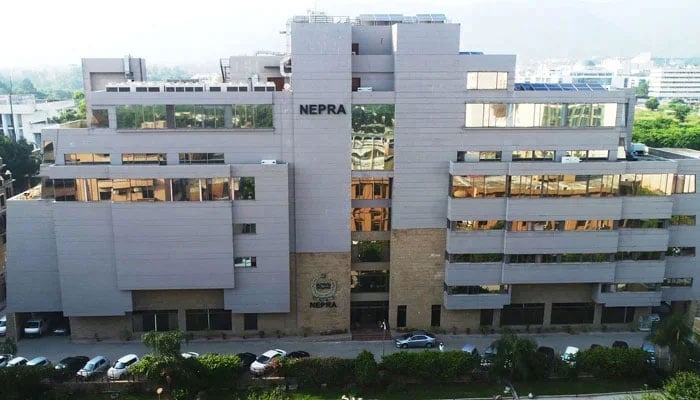Nepra imposes Rs50m fine on Iesco for grid delay
Regulator found that delays in issuing PEC to both companies contributed to substantial financial loss
ISLAMABAD: The National Electric Power Regulatory Authority (Nepra) has imposed a fine of Rs50 million on the Islamabad Electric Supply Company (Iesco) for delaying the approval of grid interconnection studies, which led to significant losses for the national exchequer.
In its decision regarding the show-cause notice issued to Iesco, Nepra stated that the company failed to adequately respond to the notice concerning delays in the approval process for studies submitted by Access Solar Private Limited and Access Electric Private Limited.
Nepra emphasized that its ruling was based on a thorough review of the submissions and arguments presented by Iesco, as well as relevant provisions of the Nepra Act and Nepra (Fine) regulations, 2021.
The regulator found that the delays in issuing the Power Evacuation Certificate (PEC) to both companies contributed to substantial financial loss. Iesco has been directed to pay the fine to Nepra’s designated bank within 15 days of the order’s issuance. Should Iesco fail to comply, Nepra reserves the right to recover the amount as arrears of land revenue or pursue other legal avenues. Iesco contested Nepra’s allegations during a hearing, claiming that it had approved the interconnection of both solar power plants at the 11kV level and that the delay was not its fault.
The company argued that during the approval process, it is standard to assess constraints in the overall system, not just in specified areas. Despite claiming sufficient approvals to achieve financial closure, Nepra concluded that these claims were not substantiated by the facts of the case.
The regulator highlighted that Iesco’s prior approvals in 2012 and 2020 were irrelevant to the current situation, as the sponsor repeatedly failed to execute the projects on time, often filing tariff petitions based on various issues, including technology changes.
Nepra noted that the PEC was issued only after a delay of seven months, which could have been resolved much sooner. In response, Iesco described Nepra’s conclusions as flawed and based on unfounded assumptions, asserting that it was not responsible for the delays in financial closure. However, Nepra dismissed these assertions as invalid and baseless, emphasizing the need for compliance and accountability in the sector.
-
 China: Stunning Drone Show Lights Up Night Sky Ahead Of Spring Festival 2026
China: Stunning Drone Show Lights Up Night Sky Ahead Of Spring Festival 2026 -
 Andrew's Epstein Scandal: Will King Charles Abdicate Following King Edward's Footsteps?
Andrew's Epstein Scandal: Will King Charles Abdicate Following King Edward's Footsteps? -
 Billy Joel Leaves Loved Ones Worried With His 'dangerous' Comeback
Billy Joel Leaves Loved Ones Worried With His 'dangerous' Comeback -
 Prince William Dodges Humiliating Question In Saudi Arabia
Prince William Dodges Humiliating Question In Saudi Arabia -
 Dax Shepard Describes 'peaceful' Feeling During Near-fatal Crash
Dax Shepard Describes 'peaceful' Feeling During Near-fatal Crash -
 Steve Martin Says THIS Film Has His Most Funny Scene
Steve Martin Says THIS Film Has His Most Funny Scene -
 Kensington Palace Shares Update As Prince William Continues Saudi Arabia Visit
Kensington Palace Shares Update As Prince William Continues Saudi Arabia Visit -
 Fugitive Crypto Scammer Jailed For 20 Years In $73m Global Fraud
Fugitive Crypto Scammer Jailed For 20 Years In $73m Global Fraud -
 Will Andrew Mountbatten-Windsor Finally Go To Jail Now That King Charles Has Spoken Out? Expert Answers
Will Andrew Mountbatten-Windsor Finally Go To Jail Now That King Charles Has Spoken Out? Expert Answers -
 Melissa McCarthy Reveals Her Tried And Tested ‘corpse’ Night Time Routine That’s Lost Her 95lbs
Melissa McCarthy Reveals Her Tried And Tested ‘corpse’ Night Time Routine That’s Lost Her 95lbs -
 Horrifying Pictures Of The Kidnapper Of Savannah Guthrie's Mother Released
Horrifying Pictures Of The Kidnapper Of Savannah Guthrie's Mother Released -
 Andrew's Ex-girlfriend Launches Brazen Attack On Epstein Victims On Piers Morgan Show
Andrew's Ex-girlfriend Launches Brazen Attack On Epstein Victims On Piers Morgan Show -
 Andrew Mountbatten-Windsor 'on His Own' As Palace Gives Green Light To Law Enforcement
Andrew Mountbatten-Windsor 'on His Own' As Palace Gives Green Light To Law Enforcement -
 Kanye West's Tweet About Super Bowl Halftime Resurfaced After Bad Bunny's Show
Kanye West's Tweet About Super Bowl Halftime Resurfaced After Bad Bunny's Show -
 'FBI' Star Juliana Aidén Martinez Tease Her Return To 'Law And Order: SVU' After Quitting
'FBI' Star Juliana Aidén Martinez Tease Her Return To 'Law And Order: SVU' After Quitting -
 Cardi B's Emotional Words To Pal Amid Stefon Diggs Rumored Breakup Revealed
Cardi B's Emotional Words To Pal Amid Stefon Diggs Rumored Breakup Revealed




